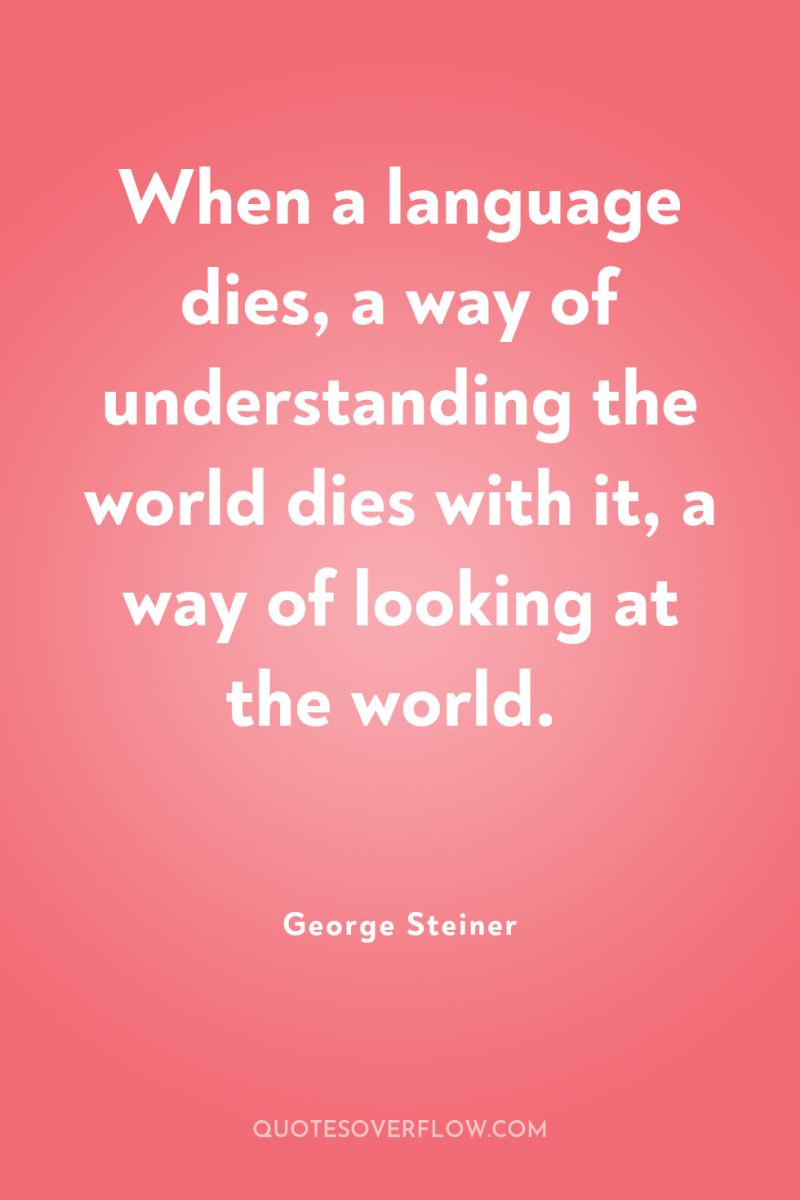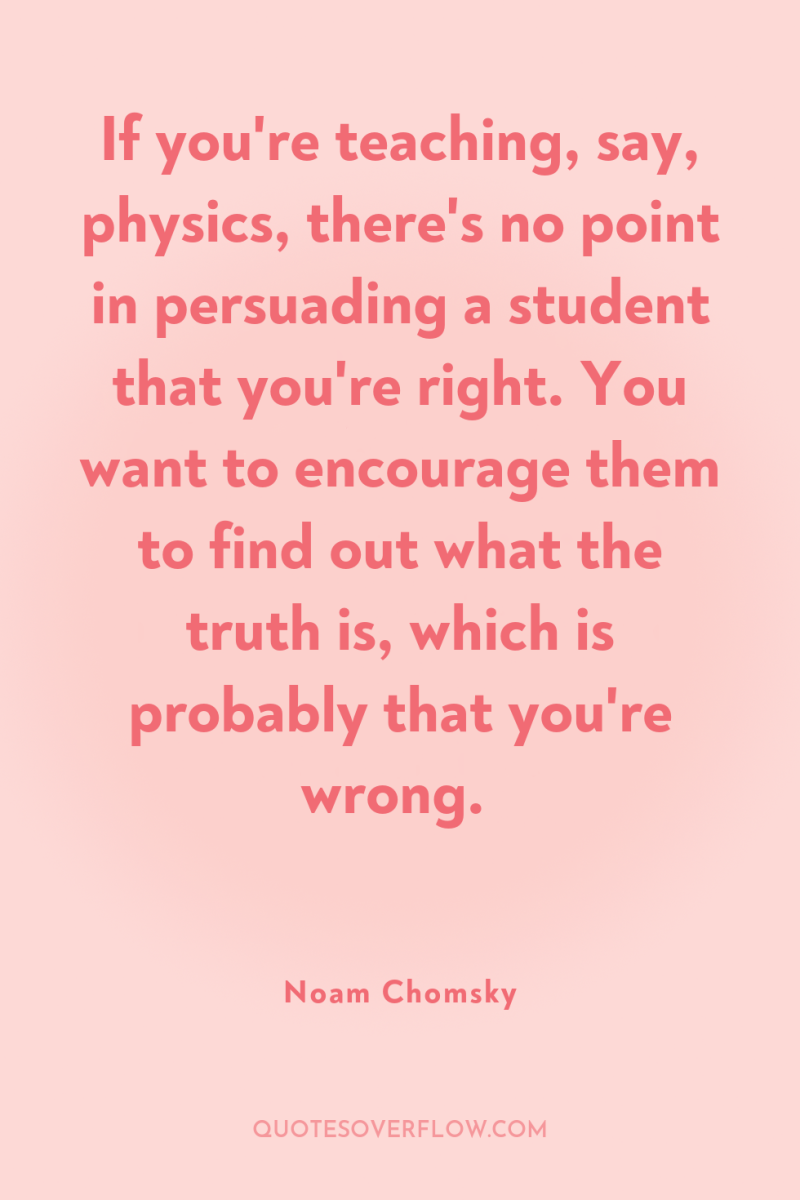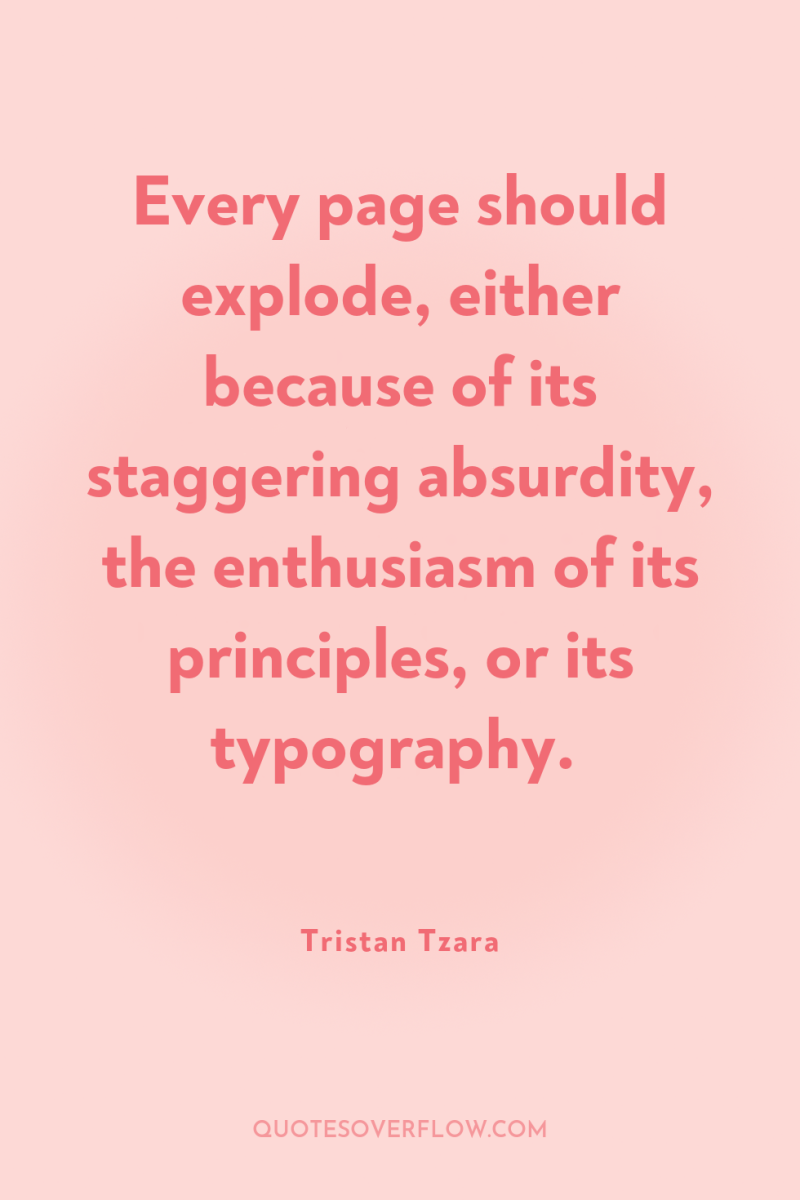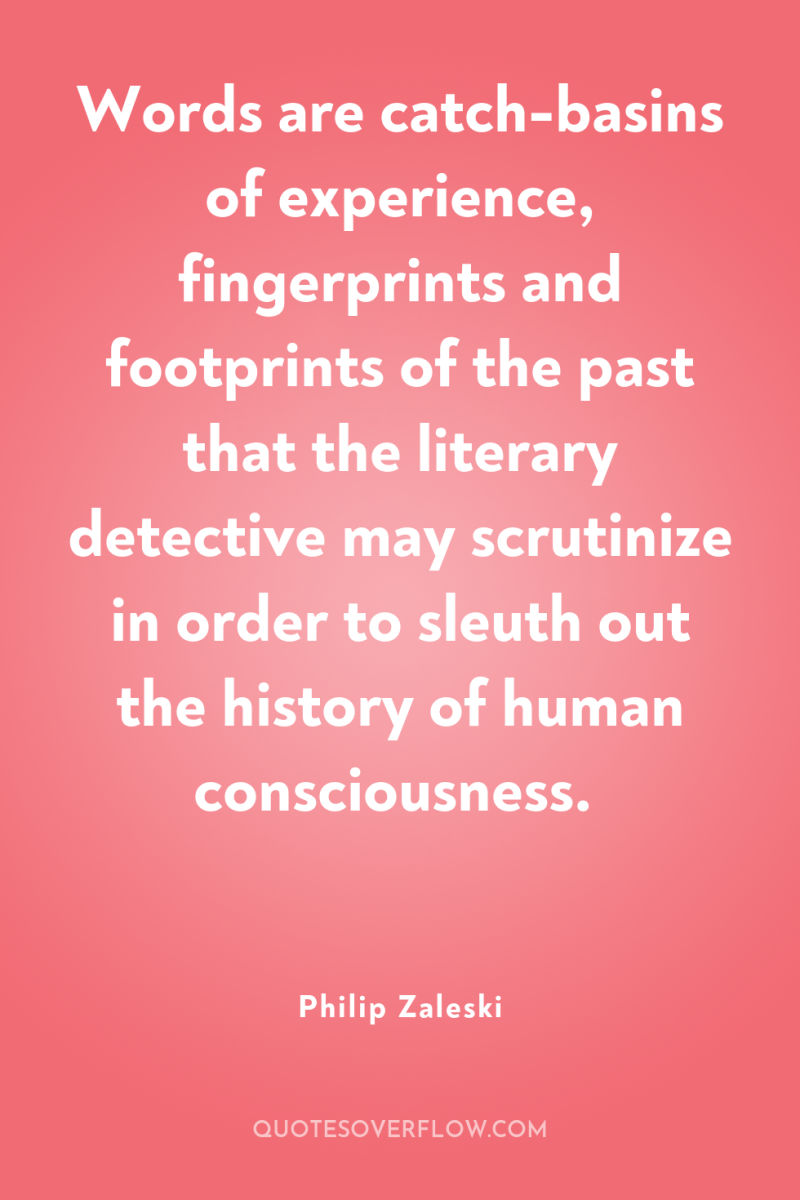
1
When a language dies, a way of understanding the world dies with it, a way of looking at the world.George Steiner
2
It seemed to a number of philosophers of language, myself included, that we should attempt to achieve a unification of Chomsky's syntax, with the results of the researches that were going on in semantics and pragmatics. I believe that this effort has proven to be a failure. Though Chomsky did indeed revolutionize the subject of linguistics, it is not at all clear, at the end the century, what the solid results of this revolution are. As far as I can tell there is not a single rule of syntax that all, or even most, competent linguists are prepared to agree is a rule. .John Rogers Searle
3
Only by the aid of language does reason bring about its most important achievements, namely the harmonious and consistent action of several individuals, the planned cooperation of many thousands, civilization, the State; and then, science, the storing up of previous experience, the summarizing into one concept of what is common, the communication of truth, the spreading of error, thoughts and poems, dogmas and superstitions. The animal learns to know death only when he dies, but man consciously draws every hour nearer his death; and at times this makes life a precarious business, even to the man who has not already recognized this character of constant annihilation in the whole of life itself.Arthur Schopenhauer
4
In the absence of a formally agreed, worldwide dictionary definition of 'Quotography' (in 2016), here are my two cents worth: 'Quotography is the art of pairing unique quotations with complementary images in order to express thought-provoking ideas, challenging concepts, profound sentiments'.Alex Morritt
5
All communication involves faith; indeed, some linguisticians hold that the potential obstacles to acts of verbal understanding are so many and diverse that it is a minor miracle that they take place at all.Terry Eagleton

6
If you're teaching, say, physics, there's no point in persuading a student that you're right. You want to encourage them to find out what the truth is, which is probably that you're wrong.Noam Chomsky

7
Those who cannot remember the past are condemned to compute it.Steven Pinker

8
Every page should explode, either because of its staggering absurdity, the enthusiasm of its principles, or its typography.Tristan Tzara

9
Words are catch-basins of experience, fingerprints and footprints of the past that the literary detective may scrutinize in order to sleuth out the history of human consciousness.Philip Zaleski
10
We cannot control the way people interpret our ideas or thoughts, but we can control the words and tones we choose to convey them. Peace is built on understanding, and wars are built on misunderstandings. Never underestimate the power of a single word, and never recklessly throw around words. One wrong word, or misinterpreted word, can change the meaning of an entire sentence - and even start a war. And one right word, or one kind word, can grant you the heavens and open doors.Suzy Kassem
11
Language is my whore, my mistress, my wife, my pen-friend, my check-out girl. Language is a complimentary moist lemon-scented cleansing square or handy freshen-up wipette. Language is the breath of God, the dew on a fresh apple, it's the soft rain of dust that falls into a shaft of morning sun when you pull from an old bookshelf a forgotten volume of erotic diaries; language is the faint scent of urine on a pair of boxer shorts, it's a half-remembered childhood birthday party, a creak on the stair, a spluttering match held to a frosted pane, the warm wet, trusting touch of a leaking nappy, the hulk of a charred Panzer, the underside of a granite boulder, the first downy growth on the upper lip of a Mediterranean girl, cobwebs long since overrun by an old Wellington boot.Stephen Fry
12
It seems that in almost all societies, the attitudes that people have to language change is basically the same. People everywhere tend to say that the older form of a language is in some sense 'better' than the form that is being used today.Terry Crowley
13
We are told that in translation there is no such thing as equivalence. Many times the translator reaches a fork in the translating road where they must make a choice in the interpretation of a word. And each time they make one of these choices, they are taken further from the truth. But what we aren’t told is that this isn’t a shortcoming of translation; it’s a shortcoming of language itself. As soon as we try to put reality into words, we limit it. Words are not reality, they are the cause of reality, and thus reality is always more. Writers aren't alchemists who transmute words into the aurous essence of the human experience. No, they are glassmakers. They create a work of art that enables us to see inside to help us understand. And if they are really good, we can see our own reflections staring back at us. .Kamand Kojouri
14
The rules of syntax and intonation and words matured over time into the system we have today because they were progressively refined by use and the forge of survival and reproduction - not because the brain got big and complicated for some other reason, and all of a sudden we discovered we could now manipulate symbols as well.Christine Kenneally
15
The job of the linguist, like that of the biologist or the botanist, is not to tell us how nature should behave, or what its creations should look like, but to describe those creations in all their messy glory and try to figure out what they can teach us about life, the world, and, especially in the case of linguistics, the workings of the human mind.Arika Okrent
16
Das mine! ' protested Ava, Bennie's daughter, affirming Alex's recent theory that language acquisition involved a phase of speaking German. She snatched a plastic skillet away from his own daughter, Cara-Ann, who lurched after it, roaring, 'Mine pot! Mine pot!Jennifer Egan
17
Language has everything to do with oppression and liberation. When the word "victory" means conquer vs. harmony and the word "equality" means homogenization vs. unity in/through diversity, then the liberation of a people from a "minority" class to "communal stakeholders" becomes much more difficult. Oppression has deep linguistic roots. We see it in conversations which interchange the idea of struggle with suffering in order to normalize abuse. We are the creators of our language, and our definitions shape the perceptions we have of the world. The first step to ending oppression is finding a better method of communication which is not solely dependent on a language rooted in the ideology of oppressive structures.Cristina Marrero
18
Trying to take away someone’s language is usually the first step in trying to change them.C. N. Lester
19
Language is a social art.Unknown
20
Don't you find it odd that two of the foremost symptoms of insanity are the hearing voices and talking to oneself? Is it any wonder that language is an area of such interest in psychology?(attrib: F.L. Vanderson)Mort W. Lumsden
21
Of all the words that exist in any language only a bare minority are pure, unadulterated, original roots. The majority are "coined" words, forms that have been in one way or another created, augmented, cut down, combined, and recombined to convey new needed meanings, The language mint is more than a mint; it is a great manufacturing center, where all sorts of productive activities go on unceasingly.Mario Andrew Pei
22
Our vocabulary may become a real time algorithmic word bank. Could you imagine having a conversation like that? Where the meaning of words constantly adapts?Natasha Tsakos
23
I would rather decline two drinks than one German adjective.Mark Twain
24
By claiming that our words are too hard to understand, the media perpetuates the idea that WE are too hard to understand, and suggests that there’s no point in trying.C. N. Lester
25
Home means always here...Will Advise
26
The words we choose can build communities, reunite loved ones, and inspire others. They can be a catalyst for change. However, our words also have the power to destroy and divide: they can start a war, reduce a lifelong relationship to a collection of memories, or end a life.Simon S. Tam
27
Conversations are like dances. Two people effortlessly move in step with one another, usually anticipating the other person's next move. If one of the dancers moves in an unexpected direction, the other typically adapts and builds on the new approach. As with dancing, it is often difficult to tell who is leading and who is following in that the two people are constantly affecting each other. And once the dance begins, it is almost impossible for one person to singly dictate the couple's movement.James W. Pennebaker
28
It may be a silly way, but if you remember that an owl looks like ʌ(OO)ʌ, it will perhaps help you remember that it is pronounced with something close to 'ʌoo'.Jakub Marian
29
Ho ho ho, tell me why you are not at home' is something Santa Claus could ask you if you stayed in a hotel over Christmas. It is most certainly not the reason why it is called 'hotel', but it will hopefully help you remember that the stress is actually on the second syllable.Jakub Marian
30
Of village: it is not called so because its inhabitants are of higher age on average; in fact, there is no connection between the words “village” and “age” whatsoever.Jakub Marian
31
I formed several possible stories out of her speech, formed them at once, so it was less like I failed to understand than that I understood in chords, understood in a plurality of worlds.Ben Lerner
32
A metaphor is not merely a linguistic expression (a form of words) used for artistic or rhetorical purposes; instead, it is a process of human understanding by which we achieve meaningful experience that we can make sense of. A metaphor, in this "experiential" sense, is a process by which we understand and structure one domain of experience in terms of another domain of a different kind.Mark Johnson
33
If there's any interaction between genes and languages, it is often languages that influence genes, since linguistic differences between populations lessen the chance of genetic exchange between them.Luigi Luca CavalliSforza
34
It may be worth while to illustrate this view of classification, by taking the case of languages. If we possessed a perfect pedigree of mankind, a genealogical arrangement of the races of man would afford the best classification of the various languages now spoken throughout the world; and if all extinct languages, and all intermediate and slowly changing dialects, were to be included, such an arrangement would be the only possible one. Yet it might be that some ancient languages had altered very little and had given rise to few new languages, whilst others had altered much owing to the spreading, isolation, and state of civilisation of the several co-descended races, and had thus given rise to many new dialects and languages. The various degrees of difference between the languages of the same stock, would have to be expressed by groups subordinate to groups; but the proper or even the only possible arrangement would still be genealogical; and this would be strictly natural, as it would connect together all languages, extinct and recent, by the closest affinities, and would give the filiation and origin of each tongue. .Charles Darwin
35
There's a grosser irony about Politically Correct English. This is that PCE purports to be the dialect of progressive reform but is in fact - in its Orwellian substitution of the euphemisms of social equality for social equality itself - of vastly more help to conservatives and the US status quo than traditional SNOOT prescriptions ever were.David Foster Wallace
36
Psycholinguists argue about whether language reflects our perception of reality or helps create them. I am in the latter camp. Take the names we give the animals we eat. The Patagonian toothfish is a prehistoric-looking creature with teeth like needles and bulging yellowish eyes that lives in deep waters off the coast of South America. It did not catch on with sophisticated foodies until an enterprising Los Angeles importer renamed it the considerably more palatable "Chilean sea bass.Hal Herzog
37
Before you judge me as some kind of 'anything goes' language heathen, let me just say that I'm not against usage standards. I don't violate them when I want to sound like an educated person, for the same reason I don't wear a bikini to a funeral when I want to look like a respectful person. There are social conventions for the way we do lots of things, and it is to everyone's benefit to be familiar with them. But logic ain't got nothin' to do with it. .Arika Okrent
38
[Philosophers] have come to envy the philologist and the mathematician, and they have taken over all the inessential elements in those studies–with the result that they know more about devoting care and attention to their speech than about devoting such attention to their lives.Seneca
39
Why is English so widespread today, and not Danish?Yuval Noah Harari
40
The reason creatures wanted to use language instead of mental telepathy was that they found out they could get so much more done with language. Language made them so much more active. Mental telepathy, with everybody constantly telling everybody everything, produced a sort of generalized indifference to all information. But language, with its slow, narrow meanings, made it possible to think about one thing at a time -- to start thinking in terms of projects. .Kurt Vonnegut Jr.
41
People's sense of how they talk tends to differ from the reality.John McWhorter
42
Language was just that thing that happened when you opened your mouth at the table, squeezed a few noises out of your vocal chords, and induced Socrates thereby to pass the salt.Randy Allen Harris
43
Possible explanations for talented language learning fall into two general areas. One view says: What matters is a person's sense of mission and dedication to language learning. You don't need to describe high performers as biologically exceptional, because what they do is a product of practice. Anyone can become a foreign-language expert - even an adult. (..) The other view says: Something neurological is going on. We may not know exactly what the mechanisms are, but we can't explain exceptional outcomes fully through training or motivation.Michael Erard
44
The fact that early languages, no matter how many there are, utilize the same streams implies that the brain doesn't have a native language. The brain can only reflect the fact that a set of neural circuits was built and activated for a certain period of time. Nor does the brain care if those neural circuits map onto things that the rest of the world calls languages or dialects. It really cares only about what activates those circuits. Thus, the brain patters that typify language use across skill levels can be mapped. Brain imaging technology monitors the intensity of oxygen use around the brain - higher oxygen use represents higher energy use by cells burning glucose. The deeply engrained language circuits will create dim MRI images, because they are working efficiently, requiring less glucose overall. More recently acquired languages, as well as those used less frequently, would make neural circuits shine more brightly, because they require more brain cells, thus more glucose.Michael Erard
45
Finally, I would like to point out that now in the age of English, choosing a language policy is not the exclusive concern of non- English-speaking nations. It is also a concern for English-speaking nations, where, to realize the world’s diversity and gain the humility that is proper to any human being, people need to learn a foreign language as a matter of course. Acquiring a foreign language should be a universal requirement of compulsory education. Furthermore, English expressions used in international conferences should be regulated and standardized to some extent. Native English speakers need to know that to foreigners, Latinate vocabulary is easier to understand than what to the native speakers is easy, child-friendly language. At international conferences, telling jokes that none but native speakers can comprehend is inappropriate, even if fun. If native speakers of English — those who enjoy the privilege of having their mother tongue as the universal language — would not wait for others to protest but would take steps to regulate themselves, what respect they would earn from the rest of the world! If that is too much to ask, the rest of the world would appreciate it if they would at least be aware of their privileged position — and more important, be aware that the privilege is unwarranted. In this age of global communication, some language or other was bound to be come a universal language used in every corner of the world English became that language not because it is intrinsically more universal than other languages, but because through a series of historical coincidences it came to circulate ever more widely until it reached the tipping point. That’s all there is to it. English is an accidental universal language. If more English native speakers walked through the doors of other languages, they would discover undreamed-of landscapes. Perhaps some of them might then begin to think that the truly blessed are not they themselves, but those who are eternally condemned to reflect on language, eternally condemned to marvel at the richness of the world.Minae Mizumura
46
Why do we say razzle-dazzle instead of dazzle-razzle? Why super-duper, helter-skelter, harum-scarum, hocus-pocus, willy-nilly, hully-gully, roly-poly, holy moly, herky-jerky, walkie-talkie, namby-pamby, mumbo-jumbo, loosey-goosey, wing-ding, wham-bam, hobnob, razza-matazz, and rub-a-dub-dub? I thought you'd never ask. Consonants differ in "obstruency"–the degree to which they impede the flow of air, ranging from merely making it resonate, to forcing it noisily past an obstruction, to stopping it up altogether. The word beginning with the less obstruent consonant always comes before the word beginning with the more obstruent consonant. Why ask why?.Steven Pinker
47
The difference between bush and ladder also allows us to put a lid on a fruitless and boring debate. That debate is over what qualifies as True Language. One side lists some qualities that human language has but that no animal has yet demonstrated: reference, use of symbols displaced of in time and space from their referents, creativity, categorical speech perception, consistent ordering, hierarchical structure, infinity, recursion, and so on. The other side finds some counter-example in the animal kingdom (perhaps budgies can discriminate speech sounds, or dolphins or parrots can attend to word order when carrying out commands, or some songbird can improvise indefinitely without repeating itself), and gloats that the citadel of human uniqueness has been breached. The Human Uniqueness team relinquishes that criterion but emphasizes others or adds new ones to the list, provoking angry objections that they are moving the goalposts. To see how silly this all is, imagine a debate over whether flatworms have True Vision or houseflies have True Hands. Is an iris critical? Eyelashes? Fingernails? Who cares? This is a debate for dictionary-writers, not scientists. Plato and Diogenes were not doing biology when Plato defined man as a "featherless biped" and Diogenes refuted him with a plucked chicken.Steven Pinker
48
The audible signals people can produce are not a series of crisp beeps like on a touch-tone phone. Speech is a river of breath, bent into hisses and hums by the soft flesh of the mouth and throat.Steven Pinker
49
And at the risk of sounding like Andy Rooney on Sixty Minutes, have you ever wondered why we say fiddle-faddle and not faddle- fiddle? Why is it ping-pong and pitter-patter rather than pong-ping and patter-pitter? Why dribs and drabs, rather than vice versa? Why can't a kitchen be span and spic? Whence riff-raff, mish-mash, flim-flam, chit-chat, tit for tat, knick-knack, zig-zag, sing-song, ding-dong, King Kong, criss-cross, shilly-shally, see-saw, hee-haw, flip-flop, hippity-hop, tick-tock, tic-tac-toe, eeny-meeny-miney-moe, bric-a-brac, clickety-clack, hickory-dickory-dock, kit and kaboodle, and bibbity-bobbity-boo? The answer is that the vowels for which the tongue is high and in the front always come before the vowels for which the tongue is low and in the back.Steven Pinker
50
Every individual is at once the beneficiary and the victim of the linguistic tradition into which he has been born.Aldous Huxley
51
Nothing is more usual than for philosophers to encroach upon the province of grammarians; and to engage in disputes of words, while they imagine that they are handling controversies of the deepest importance and concern.David Hume
52
The linguistic system represented in the mind-brain gives some account of everything submitted to it: good sentences, bad sentences, sentences in other languages, ums and ahs, coughs; perhaps -Chomsky suggests- even to non-linguistic events like a squeaking door.Neilson Voyne Smith
53
How is it that you can read this book? An obvious answer is because you know English. An equally obvious answer is because the light is on. These two explanations for an apparently trivial ability can illuminate a fundamental dichotomy: the difference between our knowledge of language and our use of that knowledge; between our competence and our performance. Your knowledge of grammar and vocabulary of English, your competence as a speaker of English, is prerequisite to your understanding this sentence; the exercise of this competence is made possible by the fact, among many others, that the light is on. .Neilson Voyne Smith
54
(..) this first-approximation reification of language very easily passes over unnoticed into a harder idealization, especially in everyday parlance. It is this idealization that, for instance, leads people to say that "the language" is degenerating because teenagers don't know how to talk anymore (they were saying that in the eighteenth century too! ). It is also behind seeing the dictionary as an authority on the "correct meanings" of words rather than as an attempt to record how words are understood in the speech community. Even linguists adopt this stance all the time in everyday life (especially as teachers of students who can't write a decent paragraph). But once we go inside the heads of speakers to study their own individual cognitive structure, the stance must be dropped.Ray S. Jackendoff
55
Polish has developed unimpeded; someone put their foot out and tripped English. The human grammar is a fecund weed, like grass. Languages like English, Persian, and Mandarin Chinese are mowed lawns, indicative of an interruption in natural proliferation.John McWhorter
56
An entire mythology is stored within our language.Ludwig Wittgenstein
57
The sage does not become trapped in semantics, does not mistake map for territory, but rather "opens things up to the light of Heaven" by flowing with the words, by playing with the words. Once attuned to this flow, the sage need make no special effort to "illumine, " for language does it by itself, spontaneously. Language spills over.Hakim Bey
58
We believe that information is an enlightening agent, but I can assure you it is not. We consume information, but we can’t read. We forgot how to sit down and engage the dense layers of a text. We are so busy devouring information that we forgot how to dance with ideas. We confuse linguistic bits of data for knowledge and ideas. I can assure you, gentlemen, they are not the same. Ideas require effort and the kind of sensibility that engages the subtle layers of meaning. What the hell does information require? .R.F. Georgy
59
Is it possible to make a sharp distinction between the content and the the form, between the personality of the Texas auctioneer and the language that he uses? Are not our attitudes toward people and events in great part shaped by the very language in which we describe them? When we try to describe one person to another or to a group, what do we say? Not usually how or what that person ate, rarely what he wore, only occasionally how he managed his job -- no, what we tell is what he said and, if we are good mimics, how he said it. We apparently consider a person's spoken words the true essence of his being.Cleanth Brooks
60
I should think a dead language would be rather boring, sociallyspeaking.Sol Luckman
61
The language looks rather different when you look at a lot of it at once.John Sinclair
62
If we should be worrying about anything to do with the future of English, it should not be that the various strands will drift apart but that they will grow indistinguishable. And what a sad, sad loss that would be.Bill Bryson
63
Because everyone uses language to talk, everyone thinks they can talk about language.Unknown
64
Definitions, contrary to popular opinion, tell us nothing about things. They only describe people's linguistic habits; that is, they tell us what noises people make under what conditions.S.I. Hayakawa
65
How many Lojbanists does it take to change a brokenlight-bulb?” goes the old Lojban joke. “Two: one to decidewhat to change it into and one to decide what kind of bulbemits broken light.Arika Okrent
66
Not everyone who knows how to write can be a writer. Not everyone who knows two languages can be a translator.Nataly Kelly
67
As long as human beings speak different languages, the need for translation will continue.Nataly Kelly
68
Poetry translation is like playing a piano sonata on a trombone.Nataly Kelly
69
In Iraq, interpreters were ten times more likely to be killed than were U.S. troops.Nataly Kelly
70
Translation software is not making translators obsolete. Has medical diagnostic software made doctors obsolete?Nataly Kelly
71
Of the 193 recognized countries in the world, only politically isolated North Korea is considered monolingual.Nataly Kelly
72
To deny access to translation and interpreting services oppresses human rights and violates laws.Nataly Kelly
73
Irish and English are so widely separated in their mode of expression that nothing like a literal rendering from one language to the other is possible.Robin Flower
74
Teach me to speak the language of men.Edgar Rice Burroughs
75
Colorless green ideas sleep furiouslythree old owls on a chest of drawerswere screwingthe daughter of the doctor. But then the mother called them, colorless green ideas slepp furiously.Umberto Eco
76
Irony is about contradictions that do not resolve into larger wholes, even dialectically, about the tension of holding incompatible things together because both or all are necessary and true. Irony is about humour and serious play. It is also a rhetorical strategy and a political method, one I would like to see more honoured within socialist-feminism.Donna J. Haraway
77
My partner and I were going to renew our vowels, but the consonants revolted.Stewart Lee Beck
78
Oh, but to reach silence, what a huge effort of voice. My voice is the way I go seek reality; reality prior to my language exists as an unthinkable thought, but I was and am fatefully impelled to have to know what thought thinks. Reality precedes the voice that seeks it, but like the earth precedes the tree, but like the world precedes the man, but like the sea precedes the view of the sea, life precedes love, bodily matter precedes the body, and one day in its turn language shall have preceded possession of silence. - Clarice Lispector, The Passion According to G.H. .Clarice Lispector
79
Grammar is politics by other means.Donna J. Haraway
80
The itchy reality of these places is that they are no place at all, they are nowhere. There’s a sleeping monster in nowhere, and it is older and bigger than you, it is island-sized, and it has never known happiness. If you’re ever nowhere at all, and you do think about it, and you can hardly think about anything else, and you can hardly breathe, and oh, God, it is awake, it is that grand realisation which nobody can speak. Don’t speak it! What would you say? But all is not lost, because in our language we have this phrase. We never have to be nowhere at all, we only ever have to be in the middle of nowhere, which is a softer, funnier place to be. Do you see? The phrase makes nowhere a place, with boundaries and a centre, and if there are boundaries then you can leave this place, you can travel in any direction and “nowhere” will cease to be, and this whole experience will be something you can laugh about.Quintin Smith